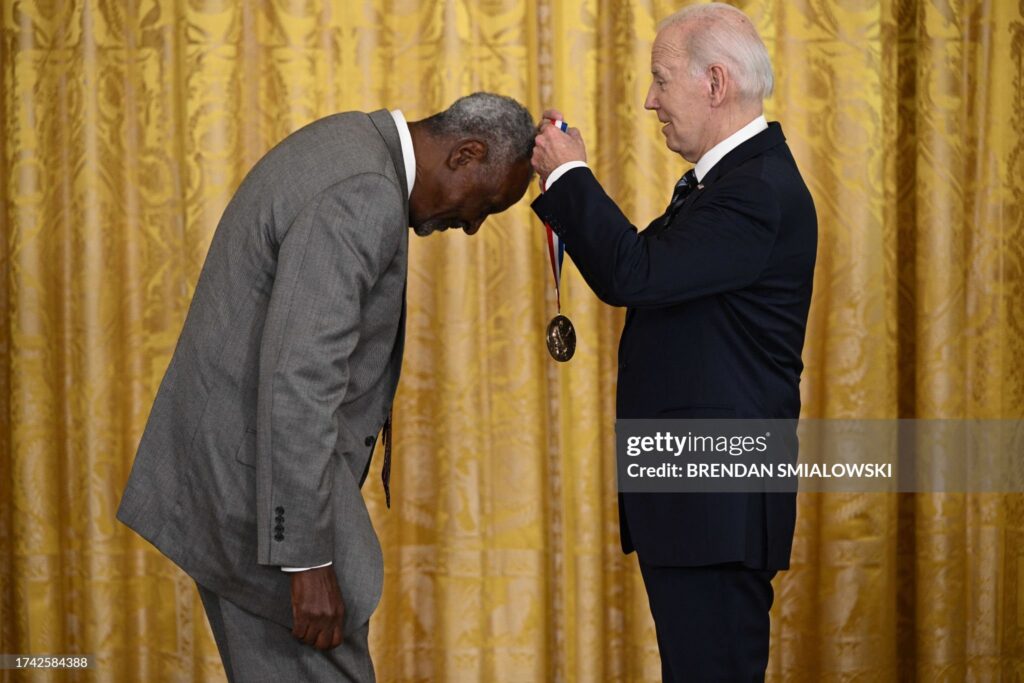President Biden Honors Dr. Gebisa Ejeta the highest recognition the nation bestows upon scientists..
The story of Dr. Gebisa Ejeta begins in Africa in the hills of west central Ethiopia born in the village of Wollenkomi. Gebisa was raised in a one-room thatched Hut by illiterate parents and learned very early of life’s hardships. “in my household, in as much as I had lots of love, because of the limited income, life was a struggle on a daily basis so hunger is something that I have personally experienced”.
Gebisa’s mother Motu Ayano was determined that her son would have a different future. She made a series of sacrifices to provide an education for her only child when a school opened in the village she scraped together the funds to enroll Gebisa. He continued his education to 8th grade some 20 Kms away. Finishing eighth grade at the top of his class Gebisa was selected to study at Jimma Agricultural and Technical school where he graduated with distinction, he then entered a Alemaya College he excelled not only in the classroom but on the basketball court as well, eventually earning a position on the Ethiopian national team. After obtaining his BS ins Plant Science from Alemaya College in 1973, he was offered a place at another University in the American Midwest that would dramatically alter the course of his life. Gebisa accepted a graduating program at the University of Purdue and earning his Masters (1976). As his research continued their political unrest was breaking out back home. There was a civil war in the country in several directions and he was advised not to return to Ethiopia. Despite the warnings, Gebisa returned briefly in 1976 to marry his wife Seniet, the two would go on to raise five children together but would not return to their homeland for another two decades.
By 1978 Gebisa would earn his PhD in Plant Breeding & Genetics, he was offered a position heading International Crop Research Institute for Semi-arid Tropics (ICRISAT)’s sorghum breeding program in Sudan and conducted sorghum research seminal for the next five years where he developed Africa’s first sorghum hybrid, a drought-tolerant variety able to withstand Sudan’s dry lands.
In January 1984, Dr. Ejeta returned to Purdue University as an Assistance Professor in the Department of Agronomy. Since then, he has led a comprehensive educational and research program at Purdue with emphasis on African agricultural research and development. He currently holds the position of Distinguished Professor of Plant Breeding & Genetics and International Agriculture at Purdue University.
Professor Ejeta has served on numerous science and program review panels, technical committees, and advisory boards of major research and development organizations including the international agricultural research centers (IARCs), the Rockefeller Foundation, the Food and Agricultural Organization (FAO) of the United Nations, and a number of national and regional organizations in Africa. He was a member of the team that launched the Alliance for Green Revolution in Africa, a joint effort of the Rockefeller and Gates Foundation. Dr. Ejeta has served the Consultative Group for International Agricultural Research (CGIAR), the largest publicly funded agricultural research consortium in the world as member of its Science Council, and later as member of its Consortium Board. He was also a board member of Sasakawa Africa Program.
Professor Ejeta has had the honor of serving at the highest level of science and policy advisory for several international development and U.S. government agencies, including as Special Advisor to the USAID Administrator Dr. Rajiv Shah, as Science Envoy of the U.S. State Department, and as a member of the UN Secretary General Ban Ki Moon’s Scientific Advisory Board. He currently serves on the boards of the Global Crop Diversity Trust, the Chicago Council for Global Affairs’ Global Food and Agriculture Program, the National Academy of Sciences Board on Agriculture and Natural Resources, the International Water Management Institute, and on the U.S. Board for International Food and Agricultural Development.
A 2009 World Food Prize Laureate and recipient of a national medal of honor from the President of Ethiopia, Professor Ejeta is a Fellow of the American Association for the Advancement of Sciences, Fellow of the American Society of Agronomy, Fellow of the Crop Science Society of America, and Fellow of the African Academy of Sciences.
Today, Dr. Gebisa Ejeta, Distinguished Professor of Agronomy, was awarded the National Medal of Science by President Joe Biden at the White House. The award is the highest recognition the nation bestows upon scientists.

According to the White House, Ejeta was honored for outstanding contributions to the science of plant genetics. By developing sorghum strains that withstand droughts and parasites, he has improved food security for millions. His advocacy for science, policy and institutions as key to economic development “has lifted the fortunes of farmers and strengthens the souls of nations.”
“Gebisa Ejeta is one of the most impactful geneticists in the world, a remarkable leader at Purdue in food security research, and a role model of perseverance for all Boilermakers. Ejeta’s achievements are specially important in playing a role for the young black generation, specially for those where he hailed from Oromia, Ethiopia. Oromo Chromatics, on behalf of the Oromo nation, would like to extend it’s appreciation of such a prestigious and richly deserved honor, bestowed by the president of the United States, to Gebisa.
